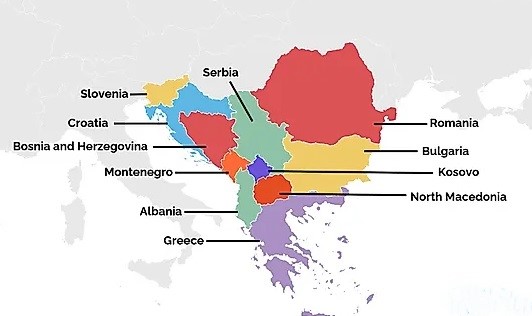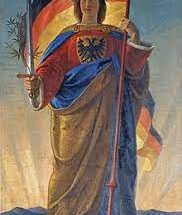The Balkans was a region of intense nationalist fervour and imperial competition in the late 19th and early 20th centuries. The desire for independence among Balkan peoples, coupled with the strategic interests of European powers, created a complex and explosive situation that contributed to the outbreak of World War I. The aftermath of these events reshaped the concept of nationalism and the map of Europe, leading to the rise of nation-states and influencing global movements for independence.
The Balkans- Detailed Overview
- The Balkans, located in Southeast Europe, is characterised by diverse geography and a mix of ethnic groups.
- Balkans countries – It includes present-day countries such as Romania, Bulgaria, Albania, Greece, Macedonia, Croatia, Bosnia-Herzegovina, Slovenia, Serbia, and Montenegro.
- The inhabitants of the Balkans are broadly referred to as Slavs, though the region also comprises other ethnic groups.
- Ottoman Dominance- For centuries, the Ottoman Empire ruled over much of the Balkans, exerting its influence over the diverse ethnic and national groups in the region.

Rise of Nationalism in the Balkans
- Shift in Nationalist Sentiment- In the latter half of the 19th century, nationalism began to evolve. Initially seen as a liberal and democratic force, it turned into a more exclusive and aggressive ideology, focusing on specific national interests and often disregarding broader humanistic values.
- Romantic Nationalism and Independence Movements- The Balkans experienced a wave of romantic nationalism, inspired by the broader European romantic movement that emphasised a deep connection to one’s nation, culture, and history. This sentiment fueled desires for independence among the Balkan peoples, leading to uprisings and demands for nationhood.
The Role of the Ottoman Empire-
- Decline- By the 19th century, the Ottoman Empire was weakening. Its attempts at modernization and reforms (such as the Tanzimat reforms) were insufficient to curb the empire’s decline.
- Nationalist Movements- Various ethnic groups within the Ottoman-controlled Balkans seized upon the empire’s decline to assert their independence, leading to a series of uprisings and the formation of new nation-states.
Imperial Interests and Rivalries in the Balkans-
- European Powers’ Involvement- Major European powers, including Austria-Hungary, Russia, and Britain, saw the weakening Ottoman Empire as an opportunity to expand their influence in the Balkans, leading to a complex web of alliances and conflicts.
- Strategic Importance- The Balkans’ strategic location, serving as a gateway between East and West, made control of the region particularly attractive to these powers.
Escalating Conflicts Leading to World War I
- Intensified Nationalist Tensions- The competing nationalist movements within the Balkans, each seeking to establish or expand their nation-state, led to heightened tensions and frequent clashes.
- Balkan Wars– The tensions in the region culminated in the Balkan Wars (1912-1913), where the Balkan League (comprising Serbia, Montenegro, Greece, and Bulgaria) initially fought against the Ottoman Empire and then against each other over territorial disputes.
- Precursor to World War I- The intricate alliances and conflicts in the Balkans, coupled with the involvement of the great powers, set the stage for the outbreak of World War I, as the assassination of Archduke Franz Ferdinand in Sarajevo in 1914 ignited existing tensions.
Nationalism Beyond Europe
- Global Anti-Imperial Movements- The aftermath of the conflicts in the Balkans and World War I saw a rise in anti-imperial movements worldwide. Colonised nations began to demand independence, inspired by the nationalist ideas that had emerged in Europe.
- Evolution of Nation-State Concept- The concept of the nation-state, where a distinct national group governs itself within a sovereign state, gained acceptance as the standard for organising societies, influencing global politics and the formation of new countries.
Also Check – The Role of Women in Nationalist Struggles – Short note
Also Check – The Frankfurt Parliament
Also Check – Why did Nationalist Tensions Emerge in the Balkans?
Also Check – Giuseppe Mazzini – Italian Revolutionary thinker
Also Check – Giuseppe Garibaldi- Italian freedom fighter
Also Check – Count Camillo de Cavour
Also Check – The Rise of Nationalism in Europe- 39 Mcqs
Also Check – The Rise of Nationalism in Europe – Class 10 – Notes
Also Check – Otto von Bismarck- Architect of German Unification
Also Check – Briefly trace the process of German unification
Also Check – Napoleon and the Napoleonic Code- Impact on European Societies and Legal Systems
